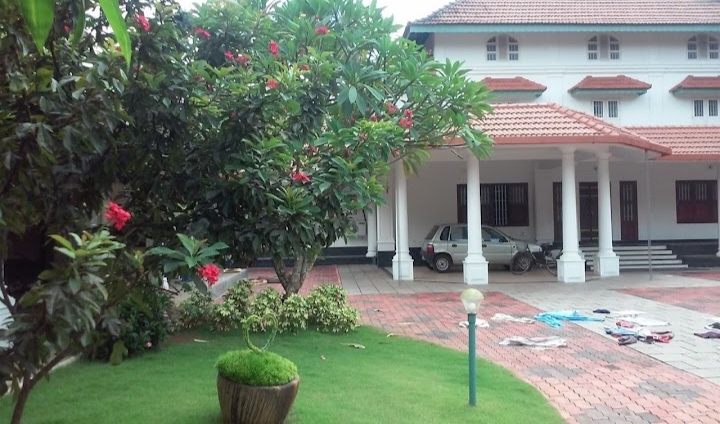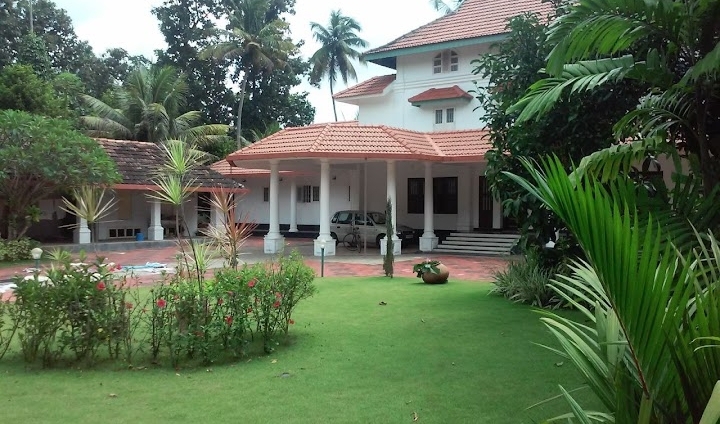Haritha Gardeners
1st Floor Kanjira Archid, Dr AR Menon Road, Oppo Malabar Eye Hospital, Naikkanal, Thrissur, 680001
Since : 1999
1st Floor Kanjira Archid, Dr AR Menon Road, Oppo Malabar Eye Hospital, Naikkanal, Thrissur, 680001
Since : 1999
Planting fruit trees in your garden or landscape can provide fresh produce, enhance the beauty of your outdoor space, and contribute to the environment. However, it requires careful planning and execution to ensure the trees grow healthily and bear fruit successfully. This is where Fruit Trees Planting Services come in, offering expert solutions for planting and maintaining fruit-bearing trees. In Thrissur, many gardening and landscaping professionals provide specialized fruit tree planting services to help you create your very own orchard or improve your garden’s yield.
Fruit Trees Planting Services involve the process of selecting, planting, and nurturing fruit-bearing trees in a landscape. These services include everything from evaluating the planting site to choosing suitable tree varieties, preparing the soil, and offering long-term care tips. Fruit trees require specific growing conditions, and professionals understand the requirements to ensure your trees flourish. By hiring professional planting services, you get expert guidance on the right tree placement, soil amendments, and maintenance practices.
Haritha Gardeners Address: 1st Floor, Kanjira Archid, Dr. AR Menon Road, Opposite Malabar Eye Hospital, Naikkanal, Thrissur, 680001
Green Earth Gardening Services Address: Palliyekkara, NH 544, Thrissur, Kerala, 680001
Thrissur Agro Landscaping Address: 2nd Floor, VK Complex, MG Road, Thrissur, Kerala, 680020
Eco Tree Planting Services Address: Vadakkumkara, Opposite Church, Thrissur, Kerala, 680517
Nurture Gardens Address: Kunnamkulam Road, Opposite Bishop Palace, Thrissur, Kerala, 680504
Nature’s Best Gardening Solutions Address: Chalakudy, Thrissur, Kerala, 680307
Garden World Landscaping Address: Koorkenchery Road, Thrissur, Kerala, 680007
Sun Green Landscaping and Garden Services Address: West Fort, Thrissur, Kerala, 680004
Fresh Start Gardening & Nursery Address: Thrissur-Kunnamkulam Road, Thrissur, Kerala, 680503
Green Garden Planting Solutions Address: Ollur, Opposite St. Antony's Church, Thrissur, Kerala, 680306
Planting fruit trees is a rewarding way to enhance your garden or landscape while providing fresh, delicious produce for years to come. Whether you're looking to create a small backyard orchard or just add a few fruit-bearing trees to your space, professional planting services can ensure your trees are planted correctly and thrive in their environment.
In this article, we'll explore the details of Fruit Trees Planting Services, including what they involve, the benefits of hiring professionals, and frequently asked questions to help guide your decision.
Fruit tree planting services encompass the full process of selecting, planting, and caring for fruit-bearing trees in residential or commercial landscapes. These services typically include site evaluation, soil preparation, tree selection, planting, and post-planting care. Professionals can provide expert guidance to ensure that your trees are well-suited to the local climate and soil conditions, increasing their chances of healthy growth and long-term fruit production.
Key Services Offered by Professionals:
Site assessment and preparation
Selection of appropriate tree varieties
Soil testing and amendments
Proper planting techniques
Pruning and maintenance
Fertilization and pest control advice
Whether you're planting apple, peach, pear, citrus, or any other fruit tree variety, these services can save you time and effort, while maximizing your chances of success.
One of the primary benefits of hiring a professional service is their expertise in selecting the right fruit tree varieties for your location. They take into account factors such as climate, soil quality, and sunlight exposure to recommend trees that are best suited to thrive in your area.
Different fruit trees have specific needs, and professionals can guide you in choosing varieties that will grow well in your environment, ensuring successful harvests in the future.
Proper planting is crucial to the long-term health and productivity of fruit trees. A professional planting service knows how to correctly space, position, and plant the trees for optimal growth. They also understand how to avoid common planting mistakes, such as planting too deep or too shallow, which can harm the tree's root system.
Before planting, professionals often conduct soil testing to assess the soil's pH and nutrient levels. This allows them to make necessary soil amendments, such as adding compost or fertilizer, to create an ideal growing environment. Proper soil preparation ensures the tree has the nutrients it needs to establish strong roots and grow vigorously.
Fruit trees require ongoing care to remain healthy and productive. Professional planting services often provide advice on long-term care, including pruning, watering schedules, fertilization, and pest management. They can help you develop a plan to keep your trees in top condition year after year.
Planting fruit trees can be a time-consuming and labor-intensive process, especially if you're planting multiple trees. By hiring professionals, you can save time and avoid the physical labor involved in digging, planting, and preparing the soil. Plus, you'll have the peace of mind that the job is done correctly from the start.
Different fruit tree varieties have different climate requirements. Some trees, such as apples and cherries, prefer cooler climates, while citrus trees thrive in warmer, subtropical regions. It's essential to choose trees that are well-suited to your local climate to ensure they grow and produce fruit successfully.
Fruit trees require well-drained soil with adequate nutrients to grow. Before planting, it's important to assess the quality of your soil and make any necessary amendments to improve its fertility and structure. Professional planting services can help with soil testing and preparation.
Most fruit trees need full sunlight (at least 6-8 hours of direct sunlight per day) to thrive. When selecting a location for planting, make sure the area receives adequate sunlight to promote healthy growth and fruit production.
Fruit trees need enough space to spread their branches and develop a healthy canopy. Additionally, some fruit trees require cross-pollination from a different variety to produce fruit. Professionals can help you plan your orchard layout and choose compatible tree varieties for pollination.
Q1: When is the best time to plant fruit trees?
A1: The best time to plant fruit trees depends on the climate and type of tree you're planting. In general, late winter to early spring is an ideal time to plant deciduous fruit trees (such as apples, peaches, and plums) before they break dormancy. In warmer regions, you can also plant fruit trees in the fall, giving them time to establish roots before winter.
Q2: How much space do fruit trees need?
A2: The amount of space a fruit tree needs depends on the variety and rootstock. Standard-sized fruit trees can require 15-20 feet of spacing between each tree, while dwarf or semi-dwarf varieties may only need 8-12 feet. It's important to allow enough space for proper air circulation and sunlight exposure, which are key for healthy tree growth.
Q3: How do I prepare the soil for planting fruit trees?
A3: Proper soil preparation involves testing the soil pH and nutrient levels, then making any necessary amendments. Fruit trees typically prefer slightly acidic to neutral soil with good drainage. Adding organic matter such as compost can improve soil structure and fertility. A professional planting service can guide you through the soil preparation process.
Q4: Do fruit trees need to be fertilized?
A4: Yes, fruit trees benefit from regular fertilization to support healthy growth and fruit production. Young trees should be fertilized in early spring, and mature trees may need additional fertilization during the growing season. The type of fertilizer and application frequency depend on the tree species and soil conditions.
Q5: How long does it take for fruit trees to start producing fruit?
A5: The time it takes for fruit trees to produce fruit depends on the tree species and variety. Some trees, such as apples and pears, may take 3-5 years to bear fruit, while others, like peaches and citrus trees, may start producing fruit in 2-3 years. Dwarf varieties often bear fruit earlier than standard-sized trees.
Q6: Do I need more than one tree for pollination?
A6: Some fruit trees, such as apples, pears, and plums, require cross-pollination from a different variety to produce fruit. In this case, you'll need to plant at least two compatible varieties near each other. Other trees, like peaches, nectarines, and citrus, are self-pollinating and don't require additional trees for fruit production.
Q7: How do I care for my fruit trees after planting?
A7: After planting, fruit trees need regular watering, especially during the first few years as they establish their root systems. Mulching around the base of the tree helps retain moisture and suppress weeds. Pruning is also important for shaping the tree, encouraging healthy growth, and improving fruit production.
Q8: Can I plant fruit trees in containers?
A8: Yes, certain dwarf fruit tree varieties can be successfully grown in containers. These trees require well-draining potting soil and regular watering, as container-grown trees dry out more quickly than those planted in the ground. Container trees may also need more frequent fertilization and repotting as they grow.
Q9: What pests and diseases should I watch out for?
A9: Common pests that affect fruit trees include aphids, caterpillars, and fruit flies. Diseases like fungal infections (e.g., powdery mildew and apple scab) can also harm fruit trees. Regular inspection, proper pruning, and pest management strategies (such as using insecticidal soap or horticultural oils) can help prevent and control these issues.
Q10: How can I ensure a good fruit harvest?
A10: To ensure a successful fruit harvest, focus on proper tree care, including regular watering, fertilizing, and pruning. Pollination is crucial for fruit production, so make sure to plant compatible varieties if needed. Monitoring for pests and diseases and taking action when necessary will also help protect your trees and promote healthy fruiting.

Thrissur, Naikkanal

Thrissur, Naikkanal
Latest Customer Reviews
"Good service and good ideas"